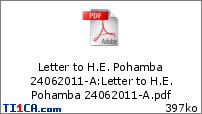
June 24, 2011
Excellency, and Dear Brother
I received the letter dated 17 June 2011 in which the SADC Summit decisions were summarised, and in which you explained the amendments to the first Roadmap, initialled by the eight political parties in the Malgacho-Malgache process. I appreciate the fact that you addressed the uncertainty regarding what the amendments to the Roadmap amount to.
We are at a delicate stage of the peace process and the progress made at the last SADC Summit should be jealously protected. Therefore I want to express my caution against any hastily made decisions purely for the sake of some movement. The communication about the latest stance adopted by SADC should be accurate, non-partisan and should be done cautiously. We are all aware that the amendments to the Roadmap as set out in the letter dated 17 June 2011 have numerous consequences and implications. One of them concerns the nature and composition of Government and the appointment of a Prime Minister. It is clear that government in its entirety, and the Prime Minister in particular, must meet the requirements of inclusivity and appointment by consensus.
I have noted that the SADC mediation team in Madagascar is complicating the matter by not acting in this spirit. By presenting the current Government and Prime Minister as meeting these criteria of inclusivity and consensus, makes a mockery of the proposed amendment and is a direct threat to the peace process. Such comments are premature and grant the current HAT a legitimate government status that it cannot claim and does not deserve. We have to remember ourselves regularly that this is a de facto regime created by a coup.
For the transitional purposes, they can become acceptable only if its composition is extended to include all the major political participants as an inclusive government, and it is based on the principle of consensus. Otherwise it remains illegitimate and its isolation by the AU and SADC should continue.
I therefore officially object to this conduct by the mediation team in Madagascar. It is against the spirit of the Summit and creates the risk of derailing the peace process.
I wish to reiterate that I shall be able to initial the Roadmap once it has been amended and finalised. I want to draw your attention to the fact that the Summit decision clearly indicated that the return of political exiles will be unconditional. With the sentence that reads: “Monsieur Marc Ravalomanana ne pourra rentrer à Madagascar qu'après l'instauration d'un environnement politique et sécuritaire favorable” in the letter dated 17 June 2011, a return to the original conditions was re-introduced, namely that I can return only after the creation of favourable political and security conditions. This is still the original condition and amounts to no amendment of the original formulation. Such a formulation is unacceptable as an amendment and will make it impossible for me to initial the new Roadmap.
The breakthrough achieved at the SADC Summit should be respected by all. It is not merely a change in formulation of the text but has direct and serious implications. It means that the unilateral actions of the HAT must come to an end; it means that the content of the amendment to the Roadmap will have to be agreed upon in an inclusive and consensual manner and not only by the HAT. Otherwise it will all amount to a continuation of the status quo and no progress in the peace process.
Sincerely,
Marc Ravalomanana
His Excellency Hifikepunye Pohamba
President of the Republic of Namibia
Chairperson of SADC
Copy to:
SADC Heads of State and Governments
Aucun commentaire:
Enregistrer un commentaire